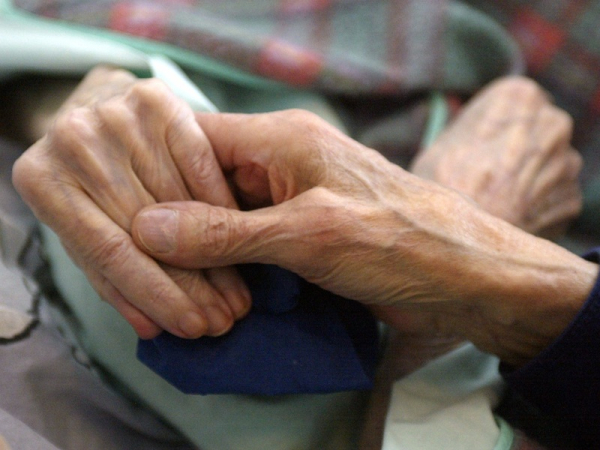
The hands of two elderly people in a nursing home in Helsinki, Finland. Finns are split over whether adult children should take greater responsibility for caring for their ageing parents due to the difficult economic circumstances, reveals a generation barometer commissioned by E2 Research, Finnish Pension Alliance (Tela) and Miina Sillanpää Foundation. (Jussi Nukari – Lehtikuva)
- Next Article Asylum applications in Finland nearly halve in 2024
THE VIEWS of Finns are split almost evenly on whether adult children should take greater responsibility for caring for their elderly parents due to the economic situation, reveals a generational barometer commissioned by E2 Research, Finnish Pension Alliance (Tela) and Miina Sillanpää Foundation.
Agreeing with the statement were 45 per cent of respondents, disagreeing 46 per cent of respondents.
The views did not vary dramatically between age groups, although opposition to the idea was the highest among 55–64-year-olds, at roughly 33 per cent.
Karina Jutila, the managing director of E2 Research, reminded YLE on Tuesday that the question is more topical to people nearing the end of their career. Such people may be prone to weighing up their ability to take on greater responsibilities more realistically than respondents in other age groups.
“Many are surely thinking that they as people have the right to realise their own dreams and that the system can’t obligate them to take care of anyone else but themselves and their children. Extending the care responsibility so broadly for the older generation is a new thought,” she analysed.
Nearly one-third of respondents viewed that it is natural for women to assume greater responsibility than men for care within families and extended families. Such views were prevalent particularly among men in the youngest group of respondents, 18–24-year-olds.
Jutila identified two possible explanations for the finding.
“New conservatism may be on the rise among young people. They’re turning back time and thinking, for example, that it’s more natural for women to take responsibility for care. On the other hand, the issue is very distant to young people. They don’t necessarily have to think about how responsibility for care will be realised in their own life in, let’s say, 30 years’ time.”
The respondents were divided also over whether parents have an obligation to financially support their adult children who have moved out, with 46 per cent agreeing and 47 per cent disagreeing that parents have such an obligation.
The idea received the most support among 18–24-year-olds, 64 per cent of whom ascribed the obligation to parents. Respondents between the ages of 25 and 75 were largely of the view that parents have no financial obligations toward their adult children who have moved out.
A vast majority of respondents indicated that it is important to make better use of the respective skill sets of youth and elderly.
As many as 90 per cent of respondents estimated that it is important for young people to take advantage of the life experience of the elderly, the share ranging from over 70 per cent among 18–24-year-olds to almost 100 per cent among over 75-year-olds. Similarly over 90 per cent of respondents expressed their support for greater intergenerational interaction.
Jutila described Finland as a very age-segmented society where people tend to spend most of their time with people from the same age bracket.
“Especially during the kind of changes we’re seeing today, we’d need the perspectives, experiences and life wisdom of older people along with the ideas of young people. And on the other hand, it’d be good to bring forth the various skills, curiosity and reform capacity of young people,” she commented to YLE.
Over 1,000 Finns responded to the online barometer at the turn of October and November 2024.
Aleksi Teivainen – HT
- Next Article Asylum applications in Finland nearly halve in 2024
Source: www.helsinkitimes.fi
